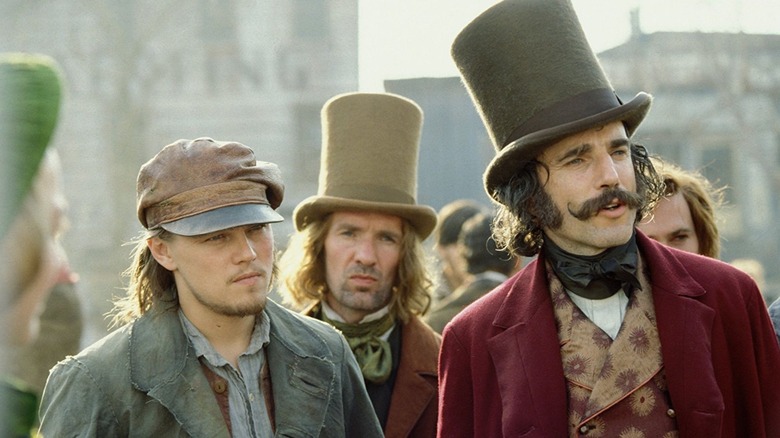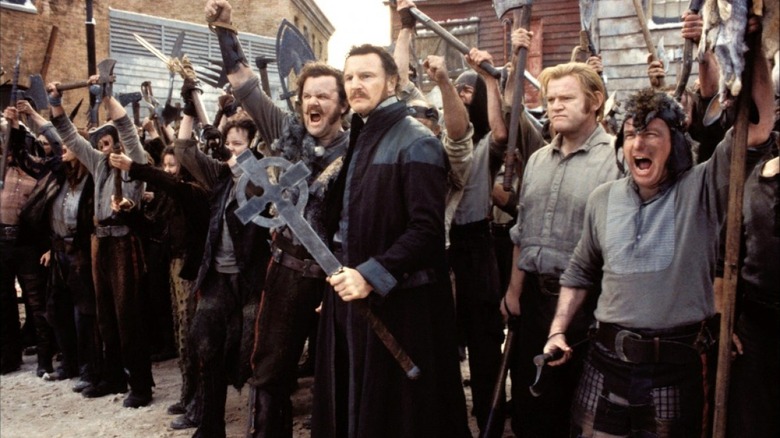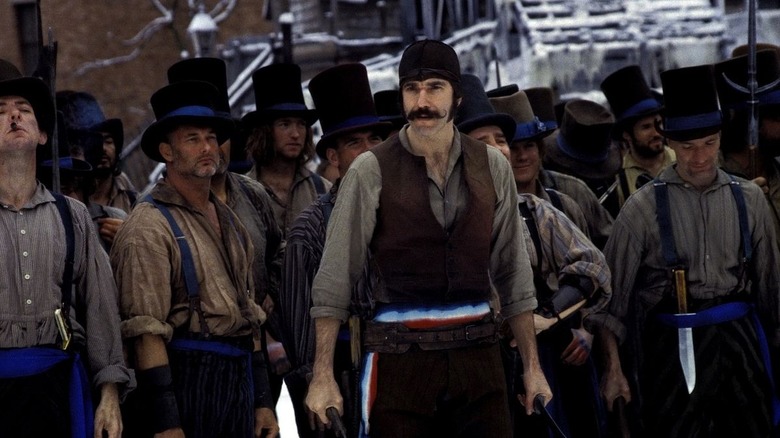Martin Scorsese Almost Quit Directing After Gangs Of New York, Because Of Harvey Weinstein
As recorded by the American Film Institute, Martin Scorsese discovered Herbert Asbury's 1927 book "The Gangs of New York: An Informal History of the Underworld" as early as 1970, back when he was a mere upstart who had only made one feature. It wouldn't be until later in the decade that Scorsese would be able to buy the film rights to the book, having acquired some clout from "Taxi Driver" and "Mean Streets." As early as 1977, there were ads in local magazines that had announced a "Gangs of New York" movie with Scorsese slated to direct. It wouldn't be until 1991, however, that a budget could be settled on, with producer Alberto Grimaldi getting $30 million from Universal. Universal, six years later, handed the rights to Disney. Scorsese would be allowed to make "Gangs of New York," but only if he and his co-screenwriter Jay Cocks added a love story element to their script.
There were legal battles and more attempts to pass the project to other studios (even Warner Bros. got involved) before Scorsese finally got to make the movie. It would be Harvey Weinstein who ultimately secured the film's hefty budget, mostly by pre-selling the film's distribution rights overseas. "Gangs of New York" was released on December 20, 2002, 32 years after Scorsese initially expressed interest. It was a long and winding road and rarely seemed pleasant. The resulting film only received middling notices, with many critics noting how chaotic and overcooked it was. It also didn't help that Scorsese and Weinstein often bickered over the film's length (Scorsese wanted to make a 225-minute cut) as well as its budget.
In an interview with GQ, Scorsese recalled his harrowing experiences with "Gangs of New York," with Weinstein, and the resultant existential crises they sparked.
Scorsese's near-retirement
The experience of making "Gangs of New York" was so prolonged and harrowing that Scorsese admits to being tempted toward never making films again. This also may have been prompted by the fact that Scorsese had signed a multi-picture deal with Weinstein's Miramax, and would be beholden to the producer's well-known temper and illogical caprices. He also admitted that he wasn't wholly satisfied with the finished version of "Gangs of New York." Scorsese famously built an entire city to film in, but the scope of the production didn't make for a wholly coherent film. He said:
"I realized that I couldn't work if I had to make films that way ever again. [...] If that was the only way that I was able to be allowed to make films, then I'd have to stop. Because the results weren't satisfying. It was at times extremely difficult, and I wouldn't survive it. I'd be dead. And so I decided it was over, really."
Scorsese's next film, 2004's "The Aviator," was co-distributed by Miramax, although it shared the finances with Warner Bros. That experience, Scorsese said, was a little bit better ... but not by much. When asked what he thought of working with Miramax again, Scorsese was blunt, saying:
"I was against that; there was a meeting, and I was forced into that position. [...] I'd already been, uh, 'made pregnant,' as they said. And there's no way you're getting out of it. But the shoot went well, the editing went well until the last couple of weeks of editing. And they came in and did some things that I felt were extremely mean."
The "mean" thing was, it seems, when both studios abruptly pulled funding at the last minute. Scorsese had to fund the film's last $500,000 himself.
Flipping desks and taking names
A 2022 article in the Independent recorded the now-infamous conflict between one of the world's most celebrated directors and one of its most notorious criminals. There were reports that Weinstein would show up on the set of "Gangs of New York" to hustle along production, not allowing Scorsese to work at his own pace. Weinstein also tried to make costume changes, notably on lead actor Daniel Day-Lewis. Day-Lewis later admitted that he stayed with "Gangs of New York" partly out of spite toward Weinstein. There was even a reported incident when one of Weinstein's go-betweens tried to make more minute changes to the script — Weinstein didn't like that one of the gangs of New York was called the "Dead Rabbits" — which caused Scorsese to fly into a rage. Evidently, he flipped over the go-between's desk and left the set for the rest of the day.
These conflicts were well-known at the time and were reported on by the New York Times. Those who were paying attention to the industry in the late 1990s and early 2000s likely recall hearing all kinds of "Bad Harvey" stories, describing the producer's propensity for temper tantrums, threats, and generally wrathful behavior. This was before knowledge of Weinstein's notorious sexual crimes came to light. At the time, Weinstein's crimes were something of an "open secret" in the industry.
Luckily, Scorsese bounced back from working with Weinstein and from the tepid reviews to "Gangs of New York," ultimately only a middling film in the master's filmography. Since "The Aviator," Scorsese has made six additional films, with a seventh, "Killers of the Flower Moon," due in theaters on October 20, 2023.


